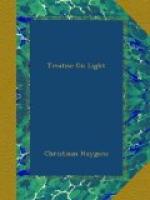Easy way to find the Irregular Refraction of each incident ray.
Demonstration of the oblique ray which
traverses the Crystal without
being refracted.
Other irregularities of Refraction explained.
That an object placed beneath the Crystal
appears double, in two
images of different heights.
Why the apparent heights of one of the
images change on changing the
position of the eyes above the Crystal.
Of the different sections of this Crystal
which produce yet other
refractions, and confirm all this Theory.
Particular way of polishing the surfaces after it has been cut.
Surprising phenomenon touching the rays
which pass through two
separated pieces; the cause of which is
not explained.
Probable conjecture on the internal composition
of Iceland Crystal,
and of what figure its particles are.
Tests to confirm this conjecture.
Calculations which have been supposed in this Chapter.
Chapter vi. On the Figures of transparent bodies which serve for Refraction and for Reflexion.
General and easy rule to find these Figures.
Invention of the Ovals of Mr. Des Cartes for Dioptrics.
How he was able to find these Lines.
Way of finding the surface of a glass
for perfect refraction, when
the other surface is given.
Remark on what happens to rays refracted at a spherical surface.
Remark on the curved line which is formed
by reflexion in a spherical
concave mirror.
CHAPTER I
ON RAYS PROPAGATED IN STRAIGHT LINES
As happens in all the sciences in which Geometry is applied to matter, the demonstrations concerning Optics are founded on truths drawn from experience. Such are that the rays of light are propagated in straight lines; that the angles of reflexion and of incidence are equal; and that in refraction the ray is bent according to the law of sines, now so well known, and which is no less certain than the preceding laws.
The majority of those who have written touching the various parts of Optics have contented themselves with presuming these truths. But some, more inquiring, have desired to investigate the origin and the causes, considering these to be in themselves wonderful effects of Nature. In which they advanced some ingenious things, but not however such that the most intelligent folk do not wish for better and more satisfactory explanations. Wherefore I here desire to propound what I have meditated on the subject, so as to contribute as much as I can to the explanation of this department of Natural Science, which, not without reason, is reputed to be one of its most difficult parts. I recognize myself to be much indebted to those who were the first to begin to dissipate the strange obscurity




